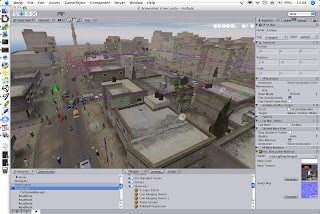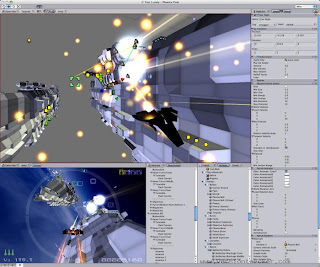While game engines like id Tech 5 and Unreal Engine 3 are undoubtedly cutting edge these days and used both for unofficial mods and also for big-money licensing, there's a number of smaller ones that have been making waves recently, particularly noted for their incredible drag-and-drop simplicity and none more so than Unity.
Originally launched as a Mac-based integrated creation tool and game engine for games that worked with a browser-based plug-in, it sat firmly in the same space as technologies such as Director and other Flash-based tools. Coming from a tiny upstart company (Danish outfit Unity Technologies), it was vital Unity worked as simply as possible, at least for gamers. The 3MB plug-in worked with all browsers and, crucially, didn’t require you to reload your webpage, much less restart your browser or enter any registration details.

Additional streaming functionality allowed for the further reduction of load times; something given away by the overall high quality of the graphics. The final key was the pricing: a $200 indie licence per seat for companies with turnover of less than $100,000; a $1,600 pro licence; or the most expensive $2,000 licence, which also includes an integrated version control server.
All told, then, it’s no surprise that year on year Unity has been growing from a secret success story into an ever more public one. Unity is currently being used to create three game portals, five virtual worlds and two MMOGs (Cartoon Network’s FusionFall and an as yet unannounced casual game from Age Of Conan publisher Funcom), while there are also several venture capital-funded projects making use of the technology, not to mention the thousands of licences sold to everyone from bedroom coders to established game studios.
There are other business implications from the model too. The 20-strong company, which splits development duties between studios in Denmark and Lithuania, plus a sales office in San Francisco, has only one full-time support person. It’s something that’s forced it to focus on ensuring the stability of releases, as well as nurturing a strong community.

What makes Unity particularly emblematic of today’s gaming culture, however, is the way it has moved from its web-player roots. First up was the ability for developers to create standalone PC and Mac games. Nothing too difficult there, although neat crossplatform features such as optimized graphics pipelines for DirectX 9 and OpenGL helped. Meanwhile, June saw the announcement of the company’s official status as a middleware provider for Wii, while there’s a current internal push to complete support for iPhone.
Of course, iPhone provides the clearest path for casual web developers to get their games on another relatively open platform, but studios are also using Unity to develop Wii titles. Finally, the company expects to add support for other consoles. Currently a Mac-only platform the platform is set to embrace PCs and Windows within the next year or two (at least according to its creators, who, while non-commital on the subject, have gone on record to say how beneficial for the firm a move like that would be).
Check out this very promising engine at http://unity3d.com/

No comments:
Post a Comment